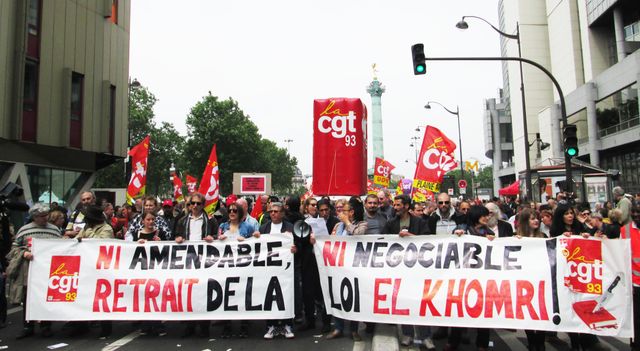By Alex Lantier and Johannes Stern 27 May 2016
As strikes spread in France and Belgium, hundreds of thousands of people participated in demonstrations Thursday in the eighth nationwide protest against the “El Khomri” labor reforms implemented earlier this month. The protests took place just two days after 60,000 people marched in Brussels to protest a similar anti-worker reform law. The demonstrations are part of a growing international struggle by the working class against mass layoffs, austerity and war.
The El Khomri law is the French version of the infamous Hartz IV laws carried out by the Social Democratic-Green coalition in Germany over ten years ago. It represents a massive attack on wages and labor rights and aims to boost French competitiveness against its European and international rivals. Under the new law firms can negotiate with local trade unions on up to 46 work hours per week, and are given greater freedom to cut wages. The law also makes it easier to fire workers.
While the widely hated government of Socialist President François Hollande is using the state of emergency introduced shortly after the Paris terror attacks last November to crack down on opposition, popular anger is erupting. According to polls more than 70 percent of the population want the law to be withdrawn. With 153,000 people protesting according to police and 300,000 according to the Stalinist General Confederation of Labor (CGT) union, the participation in the demonstration was larger than the previous week.
Though police crossed picket lines at 14 oil installations across France to try to break blockades and restart production, fuel shortages are spreading, despite the release of strategic oil reserves by the state and oil companies. As of Thursday evening, 5,000 of France’s 12,000 gas stations were missing at least one type of fuel. A CGT member on a picket line at an oil installation at Fos-sur-Mer was run over by a driver and had to be evacuated by helicopter. Two strikers blockading an industrial zone near Vitrolles were wounded when a truck tried to drive through the blockade.
Demonstration advancing from Place de la Bastille
As port workers, oil workers and truckers continued to take strike action in France, the country’s 19 nuclear plants went on strike, as well as the DCNS nuclear submarine works in Cherbourg, which were blockaded by employees protesting the labor law. Power cuts were reported across northern and western France, as production fell by a total of 5,000 megawatts.
In Belgium, a rail strike against the pro-austerity government’s labor reform virtually shut down public transport in Brussels and French-speaking regions to the south, while only one train was running in the Flemish areas.
As protest marches passed through cities across France, reporters for the WSWS intervened to cover protests and interview the marchers in Paris and Marseille, and distribute the statement, “
 Samuel
Samuel
At Bastille Square in Paris, the WSWS spoke to Samuel, a public sector worker strongly opposed to the El Khomri law and France’s Socialist Party (PS) government. He explained, “We can’t let this El Khomri law pass; it is a step back for workers’ rights. The PS government of François Hollande and Manuel Valls says it is left-wing, but it isn’t.”
Samuel expressed his international solidarity for strikers in Belgium. He added, “There is a right to strike, it is inscribed in the constitution. It may be the only right we can still use in order to have an impact and push things in the right direction.”
He said that he considered that the PS government was in the service of a dictatorial financial oligarchy, declaring, “The people must rise up and struggle for a true democracy. Currently, we do not have democracy; we have small groups of people who work among themselves for the very wealthy.”
The WSWS also spoke to Donovan, a service worker in Paris, who expressed his concerns about the El Khomri law: “I know this law will impact many companies, there will be abuses. A law that makes such actions so easy for employers, and takes away rights from employees, workers or any social class is bad, in my view.”
He indicated his suspicion that the state of emergency imposed after the November 13 attacks in Paris was in fact largely aimed at suppressing domestic opposition: “They pile on the tension under the pretext of the state of emergency; they can use the state of emergency for their own purposes and adapt it to different situations.”
 Donovan
Donovan
Donovan also stressed his support for workers taking strike action against the law, stating, “We’re in a context where if you speak out and say something, the authorities do not listen at all, absolutely not. Striking becomes almost a duty.”
After the march started from Place de la Bastille and swelled, clashes broke out when unidentified masked provocateurs appeared and launched clashes with the security forces near Chaligny Street. Again, youth protesters were placed in the front of the march, and were cut off from the main trade union delegations as they entered Nation Square, where they were violently attacked. At least one young protester was seriously wounded by a grenade fragment.
Throughout the country the security presence was massive. According to reports, the Paris police confirmed they have put 19,000 officers on the streets to confront the protestors. Reportedly at least 77 people have been arrested.
Also in other cities across France the protests turned violent with thousands of angry demonstrators confronting heavily armed antiriot police. In the southwestern city of Bordeaux, about 100 people attacked a police station and damaged a police car. In Nantes protesters smashed bank windows while security forces responded with tear gas.
Police blocking protesters in Paris
In the port city of Le Havre at least 10,000 dockworkers and other protesters gathered. According to media reports, the mood in front of the city hall was heated. Protesters set off smoke bombs and shot fireworks into the air as the square reverberated with explosions. Posters at the scene bore a blood-red tombstone representing the labor bill reading: “Not amendable, not negotiable: Withdraw the El Khomri Law.”
French Prime Minister Manuel Valls insisted in an interview on BFM television that the “heart” of the bill should remain. Withdrawing the bill “is not possible,” he declared. “There could be improvements and modifications” in the bill, he said. Valls didn’t elaborate on what might be changed but provocatively declared that the bill was “good for workers” and accused the CGT of being “irresponsible.”

Not amendable, not negotiable - Withdraw the El Khomri Law
Despite its militant posturing, many workers know that the CGT—which supported Hollande in the 2012 presidential election—is not a political opponent of the PS and is not representing the interests of the workers. Earlier this week the WSWS explained: “CGT leader Philippe Martinez is pushing the union to adopt demands that are emerging spontaneously among workers, partly to better position the CGT against competing union bureaucracies, but above all to avoid a rebellion of the working class against the entire political setup and confine the workers to the straitjacket of a national struggle.”
WSWS reporters in Marseille spoke to two youths, Mohamed and his friend, about the struggle against the labor law. Mohamed said he thought international solidarity in the struggle against austerity is very important, saying: “I think what is happening is good, despite the differences between people: even though we do not have the same laws, we are together. I think we had lost that for many years and now we are finding it again. Even though we have to sacrifice to block the economy, what is happening is beautiful.”
Commenting on the CGT’s participation in last week’s pro-police demonstrations by forces close to the neo-fascist National Front, Mohamed’s friend declared, “I do not think the CGT will unify the masses. The CGT has betrayed us, the CGT is losing credibility. It is not thanks to the CGT that we will block the passage of the law.”
He sharply condemned the PS government’s use of the security forces to smash factory and workplace occupations: “I think it will sicken people, it will wake them up and they will realize that we must not adopt this law. One can see that things could very rapidly develop into a civil war, things could create enormous conflict between the population and the political establishment.”



.jpg)
.jpg)



0 comments:
Post a Comment